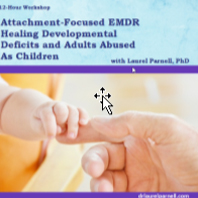Clients who have experienced childhood traumas which have impacted their capacity to form close emotional relationships in adulthood require adjustments to the procedural steps of EMDR. These relational traumas include physical or sexual abuse, neglect, early losses, birth or medical trauma, caregiver disconnection, and vicarious trauma. For EMDR therapists to succeed with this population, they need an advanced understanding of EMDR that includes an attachment-repair orientation.
Based on material from Dr. Parnell’s book, Attachment-Focused EMDR: Healing Relational Trauma, this workshop presents practical information to encourage the creative use of EMDR with these clients. Through lecture, case examples, and video demos, you will learn how to integrate an attachment-repair orientation into EMDR treatment.
Learning Objectives
Upon completion of this workshop, you will be able to:
- Describe the five basic principles of Attachment-Focused EMDR and how they can be integrated into the treatment of relational trauma
- Discuss how an attachment focus can be integrated into the history taking and preparation phases of EMDR
- List the most useful resources to install, and how to integrate them into EMDR with an attachment focus
- Describe how to repair early developmental stages using imagination and bilateral stimulation
- Name three techniques for working with dissociation
- Describe four ways to integrate an attachment focus into EMDR’s desensitization, installation, closure, and re-evaluation phases
- Utilize at least four interweave strategies
- Describe how and why to adapt the standard EMDR protocol for clients with attachment wounds
Learn Practical Ways to Integrate a Relational, Client-Centered Approach to Healing Attachment Trauma
For many traumatized clients, attachment repair is a critically important component of successful treatment. Over the last two decades, Attachment-Focused EMDR has emerged as one of the most powerful clinical tools available to effectively and efficiently help trauma therapists improve their therapeutic outcomes.
Through 7 powerful sessions, Dr. Parnell will teach you how to modify traditional EMDR protocols to use with your most difficult and challenging clients.
Centered around videos of actual client sessions conducted by Dr. Parnell, you’ll be able to experience, not just hear, how to apply Attachment-Focused EMDR to your trauma treatment approach.
Dr. Laurel Parnell will guide you step-by-step through 7 intensive sessions:
Session 1: The 5 Basic Principles of Attachment-Focused EMDR
Session 1 lays the groundwork for Attachment-Focused EMDR and details what is needed from you, as an EMDR therapist, to repair your client’s attachment wounds.
Session 2: Tapping in Resources
In this session, Dr. Parnell outlines the steps to effectively install the 4 most important resources a client must have to process their traumatic memories. Watch Dr. Parnell use these steps in an in-session video demonstration with a client.
Session 3: Utilizing Love Resources and Other Attachment Repair Resources
Building on your new resource installation skills and understanding of the 4 most important attachment repair resources, Session 3 covers alternative resources that clients may develop. These include creating new parents, utilizing love resources and the right way to use the therapist as a resource.
Session 4: Preparing Clients for EMDR
With resources installed, you and your client are ready to begin EMDR treatment. In this session, you’ll explore the 3 phases of Attachment-Focused EMDR treatment:
- Assessment and preparation
- Processing and integration
- Creativity, spirituality and integration
You’ll also get valuable techniques to help prepare your clients for treatment.
Session 5: The Modified Protocol
How does an EMDR therapist manage challenging clinical situations? This session gets into strategies and steps to modify the standard EMDR protocol. Through demonstration videos and discussion, you’ll learn the 5 benefits of the modified EMDR protocol. Explore how and why you should adapt the standard EMDR protocol for clients with attachment wounds.
Session 6: Successful Target Development
In this session, you’ll master techniques to get through the most challenging parts of EMDR therapy. You’ll receive 4 ways to integrate an attachment focus into the desensitization, installation, closure and re-evaluation phases of EMDR. Gain valuable strategies to successfully use the bridging technique.
Session 7: Helping Clients with Processing Difficulties and Using Interweaves
Processing difficulties can quickly derail an EMDR session if you aren’t prepared for them. In this session, Dr. Parnell teaches you techniques to help your ”stuck” clients work through their processing difficulties by:
- Working with abreactions
- Helping clients who dissociate during EMDR
- Working with numbness, sleepiness and memory changing
Through in-session video demonstrations and discussion, Dr. Parnell will teach interweave strategies and show you the right way to close an EMDR session so your clients can fully process their memories and leave the session at peace.
Note: this workshop is not a substitute for EMDR Basic Training.
You should have already completed a basic training in EMDR before making use of the approach taught in this workshop. If you are interested in taking this training review our training schedule.
Digital Download: $400

